Unit 2 What should I do-教案
八年级英语下册_unit2_what_should_I_do课件人教版.Section_A

• (5)be +形容词+enough for sb to do sth • be+not+形容词+enough for sb to do sth • The questions are easy enough for students to understand. • The questions are not difficult enough for students to understand.
Grammar should (shall) could (can)
情态动词和其他动词连用,可表示说话人的语气, 可表达建议、要求、可能和意愿等, 没有人称和 数的变化。
a. should与 could用于表示劝告、建议时, 可理解为“应该” , could比should语气委 婉。 b. should (shall)用于表示“必定”。 c. could (can)用于表示 “可能”或“预 Should is more serious than could. 测”。
What’s wrong with the dog?
I often feel very tired. What should I do? You look worried. What’s the matter?
What should he do?
He should have a rest.
be in style=be in fashion时髦的 be out of style 不时髦的
你怎么了? 这一问句通常用于看到别人着急、不愉快、生病 或出了某事故时,来问情况的。 类似的表达还有:
1.What’s wrong with sb/sth?
2.What’s the matter with sb/sth?
Unit 2 What should I do?

( )y yudig B ae o o n
此题 主要 考 时态 。( 项是 一般 现在 A) 时 态 , B 项 是 现 在 进 行 时 态 , C) 是 过 去 时 ( ) ( 项 态 。从 答 语 “ 在 找 我 的 篮 球 运 动 鞋 ” 看 , 以 我 来 可
例 1 Whta batu set ! H w m c 一 a eufl w a r o uh i e
ddyu i o
— —
fri? o t
他将要花 30 00英镑来买这张邮票。
( )ae At k
( py C) a
( )ot B cs
( sed D) p n
等) , ” 主语
如 : o h udw ial t oe Y u so l at il m r. te
br w是 指 向别 人借 东 西 , “ 人 ” l d oo r 即 借 ;e n 是指把东西借给别 人 , 借 出” o o 即“ 。br w常用 的 r
句型是 br ws . rm s. 向某人借某物” l d or h f “ o t o b ; n e 常用 的句型是 l ds . o b 或 l ds. t.“ e h t s. e s n t n b h 把 某物借 给某人 ” 。
・
此题考查“ 花费 ” 的区别 。此题 主语是
(n d i i) o g n
“ , 且 py常 与 f 人” 并 a o r连用 , 为 “ …… 付 意 为
款” 故此题选( ) , C。
( C)
nb o s ok
b d,L n ln ? e a ga g
学 法指 导
【 知识规律总结】
unit 2 what should i do

2. Everyone else in my class was invited except me, and I don’t know why. ① else修饰不定代词(something, somebody, 等),疑问代词(who, which, 等)和疑问副 词(when, where等)用在这些词后面,译为 “别的” e.g.: What else can you do? ② except是介词,表示“除了……”, except强调“除去”(后边跟的人或物不包含 在里边) 除了汤姆,大家都能游泳。 Everybody except Tom is able to swim.
Unit 2 What should I do
Section B
梁山县体育中学
程广秋
Clothes make the man. 人靠衣装,佛靠金装。 Her clothes are out of style.
What kind of clothes do you like?
original
(different from others, special)
3b
Think of some advice for “lonely kid”. Fill in the blanks in Mary’s letter.
Advice
1.You could talk to your best friend. 2.Or maybe you should write a letter to him. 3.You could also call him up and send your best wishes to him.
Clothes are not a serious problem. Friends are more important than clothes. Without friends, we will feel lonely. No one wants to be lonely.
Unit 2 What should I do
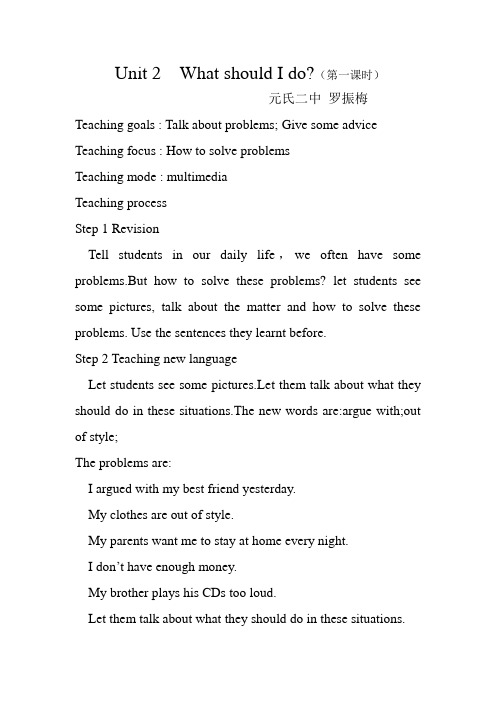
Unit 2 What should I do?(第一课时)元氏二中罗振梅Teaching goals : Talk about problems; Give some advice Teaching focus : How to solve problemsTeaching mode : multimediaTeaching processStep 1 RevisionTell students in our daily life,we often have some problems.But how to solve these problems? let students see some pictures, talk about the matter and how to solve these problems. Use the sentences they learnt before.Step 2 Teaching new languageLet students see some pictures.Let them talk about what they should do in these situations.The new words are:argue with;out of style;The problems are:I argued with my best friend yesterday.My clothes are out of style.My parents want me to stay at home every night.I don’t have enough money.My brother plays his CDs too loud.Let them talk about what they should do in these situations.Let them use You should…You could…to solve these problems.The advice may be:You should say you’re sorry.You should buy some new clothes.You should talk with them about your problems.You could get a part-time job.You should talk to him about your problem.Step 3 listening practiceRead the instructions to the class.Say,Listen to the tape circle the problems that tou hear the girls talking about.Check the answers.The following problems should be circle:My parents want me to stay at home every night.My brother plays his CDs too loud.I don’t have enough money.My clothes are out of style.Let students read the listening material together.Ask a student what the girl’s problems are.Step 4 Speaking practiceThis activity provides guided oral ing the target language.Let students practice this dialogue.They can practice like this:A: You look unhappy, what’s the matter with you?B: …what should I do?A: Maybe you should…/you could…B: Good idea.Make conversations like this. Tell students give more advice as much as possible.Step 5 Writing practiceLet students translate a Chinese article into English.The Chinese article is:这几天,我不高兴。
英语:Unit_2_What_should_I_do知识点训练课件(人教新目标八年级下)
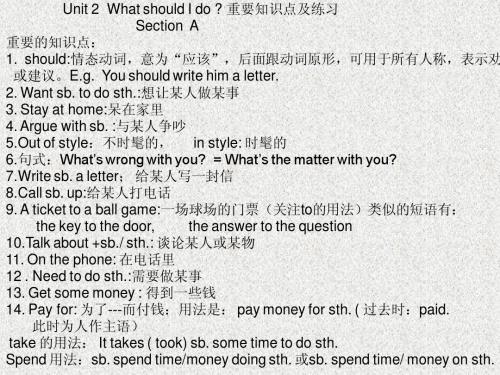
7.—I think you should go to bed early every day. A. Thank you for helping. C B. Of course. C. It doesn’t matter. D .That’s a good idea. 8.”_______” “I argued with my best friend.” A. How are you? B B. What’s wrong? C. Can I help you? D .Good morning! 三.句型转换: 1 .Could you ask him to give me a call, please? (改写同义句) Could you ask him to _____ _____ ______, please? call me up 2 .Dave had a headache last night.(对划线部分题问) _____ _____ _____ _____ with Dave? What the matter with 3. You should buy some new clothes. What should do _____ _____ I _______? 4. He should ask their parents for some money.(否定句) shouldn’t ask any He ________ _____ their parents for ______money. 5. The room is too small to hold so many people.(同义句) big enough The room isn’t ______ ______ to hold so many people. 6. His father bought him a new computer.(同义句) His father bought a new computer _____ him. ______ for 7.Tom spent 20 yuan on a book last Sunday.(同义句) paid for Tom _____ 20 yuan _____ a book last Sunday. 8.The box is too heavy for me to carry.(同义句) The box isn’t light enoughfor me to carry. _____ _____ 9. Anna paid 200 yuan for the new jacket.(同义句) Anna spent yuan _____ the new jacket. ______ on
八(下)Unit2 what I should I do 精品教学资料包(精品课件+精品导学案+精品
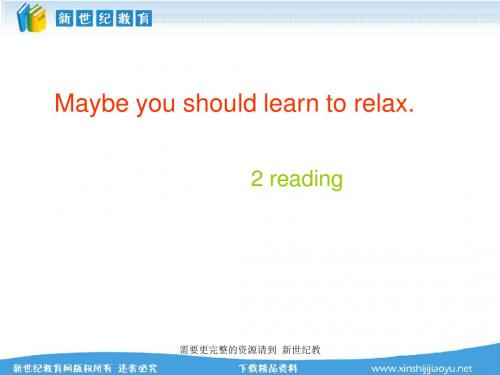
G. to have something as part of a whole
H. ask to go to some places I. try hard to make someone do something J. try to know the differences between two things
需要更完整的资源请到 新世纪教 育网 -
K. say unhappiness about something
Reading strategy:
You will learn to use new words better if you use a learner’s dictionary. A bilingual dictationary sometimes gives the wrongmeaning for the situation you want.
需要更完整的资源请到 新世纪教 育网 -
Maybe you should learn to relax!
• • •
• •
Questions Are American and British children also under great pressure? What after-school activities do most children take part in? What do the pushy parents seem to do now? What does Dr Alice Green think the parents should do ?
• What does Dr Alice Green think the parents should do ?
八年级英语 unit2 what should I do课件人教

My clothes are out of style.
不时髦的
Look at the problems in activity 1a and make conversations.
A: What’s wrong?
B: My clothes are out of style. A: Maybe you should buy some new clothes.
1a Look at these problems. Are they serious or not?
Write them in the appropriate box.
Serious
Not serious
My parents want me to stay at home every night.
Task 1:成长中的烦恼
Do you have some problems in your daily life or in your study? Write them down.
1. My parents want me to stay at home every night. 2. I don’t have enough money to… . 3. I argued with … . 4. My friends didn’t invite me to his birthday party. 5. … …
Do you have any good suggestions?
eg: I argued with my best friend. What should I do?
You could … . Maybe you should … . I think you should … . I think you’d better … . You shouldn’t … .
八年级英语下册-unit2-What-should-I-do整单元课件-人教新目标版
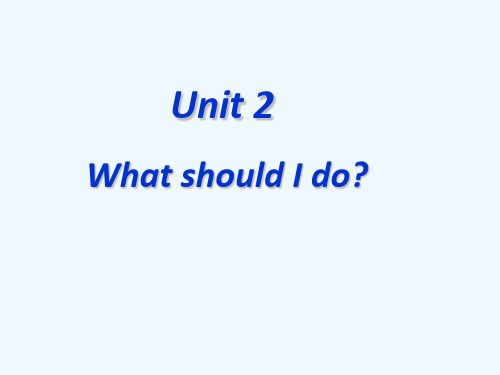
argued with
What's wrong? What should she do?
What's wrong? What’s the matter? What should she do?
...plays his CDs too loud
A: What's wrong? B: My clothes are out of style. A: Maybe you should buy some
Everybody has his or her problems.
I have mine. What's it? My mom plays music too loud. I can't stand it at all. What should I do? You should...
play v.播放
2a Listen. Peter's friend is giving him advice. Circle the word "could" or "should".
____________________
give him a call ______________ phone him
__________________________
2b Listen again.
Why doesn’t Peter like his friend’s advice?
Draw lines to match the advice with the reasons.
Advice
1. You could write him a letter. 2. Maybe you should call him up. 3. You should say you’re sorry. 4. Maybe you could go to his house. 5. You could give him a ticket to a ball game.
八年级英语下册Unit 2 What should I do- 知识讲解

八年级英语下册Unit 2 What should Ido? 知识讲解Unit2whatshouldIdo?【单元目标】1.单词与短语stereo,loud,argue,original,serious,style,wrong,argu ment,either,teen,talk,family,tutor,haircut,caller,e xcept,upset.wantsb.todosth. 2.playone’sstereo 3 stayathome4.arguewithsb/haveanargumentwithsb.5.beoutofstyle6.writesbaletter/writeto7.talkabout8.onthephone9.surprisesb.10.payfor 11.getapart-timejob 12.borrowsth.fromsb.13.asksb.for…14. haveabakesale 15.findout16.beupset17. call…up 18.thesameas9. getonwellwithsb.20. returnsth.21.haveafightwithsb.22.from…to…23. dropoff 24.preparefor25.after-schoolclubs26.beusedto27.fillup 28.takethemiddleroad2.目标句型:.whatshouldIdo?2.whydon’tyou…?3.youcould…4.youshould…5.youshouldn’t…3.语法情态动词的用法Ⅰ【重难点分析】情态动词Ⅰ*情态动词也可称为“情态助动词”,因为它和基本助动词都属于助动词类。
*情态动词和其他动词连用,可表示说话人的语气。
*情态动词可表达建议、要求、可能和意愿等。
*情态动词没有人称和数的变化。
*常用的情态动词有:can,could,may,might,must,shall,should,will,would这九大情态动词;其他的还有oughtto,need,dare等。
鲁教版五四制初三英语unit2教案【超详细】
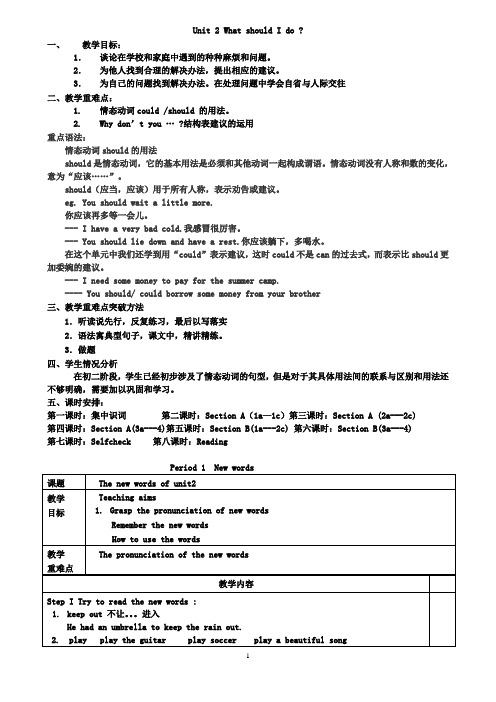
Unit 2 What should I do ?一、教学目标:1.谈论在学校和家庭中遇到的种种麻烦和问题。
2.为他人找到合理的解决办法,提出相应的建议。
3.为自己的问题找到解决办法。
在处理问题中学会自省与人际交往二、教学重难点:1. 情态动词could /should 的用法。
2. Why don’t you … ?结构表建议的运用重点语法:情态动词should的用法should是情态动词,它的基本用法是必须和其他动词一起构成谓语。
情态动词没有人称和数的变化,意为“应该……”。
should(应当,应该)用于所有人称,表示劝告或建议。
eg. You should wait a little more.你应该再多等一会儿。
--- I have a very bad cold.我感冒很厉害。
--- You should lie down and have a rest.你应该躺下,多喝水。
在这个单元中我们还学到用“could”表示建议,这时could不是can的过去式,而表示比should更加委婉的建议。
--- I need some money to pay for the summer camp.---- You should/ could borrow some money from your brother三、教学重难点突破方法1.听读说先行,反复练习,最后以写落实2.语法寓典型句子,课文中,精讲精练。
3.做题四、学生情况分析在初二阶段,学生已经初步涉及了情态动词的句型,但是对于其具体用法间的联系与区别和用法还不够明确,需要加以巩固和学习。
五、课时安排:第一课时:集中识词第二课时:Section A(1a—1c)第三课时:Section A (2a---2c) 第四课时:Section A(3a---4)第五课时:Section B(1a---2c) 第六课时:Section B(3a---4)第七课时:Selfcheck 第八课时:ReadingPeriod 5 SectionB(1a-2c)Period 6 SectionB(3a-4)Period7 SelfcheckPeriod 8 Reading。
八年级英语下册_unit2_what_should_I_do课件人教版

Yours,
Mary
I. 根据汉语提示,完成下列句子。每空一词。
1. 我花了五美元买这些书。 paid for spent on I ________ five dollars ________ the books. 2. 我问他如何才能学好英语。 how to learn I asked him _______________ English well. 3. 你认为她会和你就那件事争吵吗? argue with about Do you think she will _________you ________ that?
Language points:
1. find out,找出;查明 find out 意为“找出” “发现” “ 查出(真 相) ” find和find out都有发现的意思,二者的语义差别是:find往往指凭一时的
直接感觉或偶然发现,而find out则需经一番努力后发现出来,有“查明,
弄清”的意思。
2. I don’t know what to do. 我不知道该做什么。
疑问词 + 动词不定式结构,表示一个完整的 含义,在句中可以做主语,宾语,表语等。 这种结构经常放在tell,show,teach,forget,find out等词后作宾语。
I can’t decide where to go for vacation. I asked her how to make dumplings.
Language points:
tell sb. to do sth. 告诉某人做某事 Mother told me to have healthy food to keep fit. tell sb. not to do sth. 告诉某人不做某事 The teacher tells us not to talk in class.
八年级英语下册 Unit2学案 人教新目标版
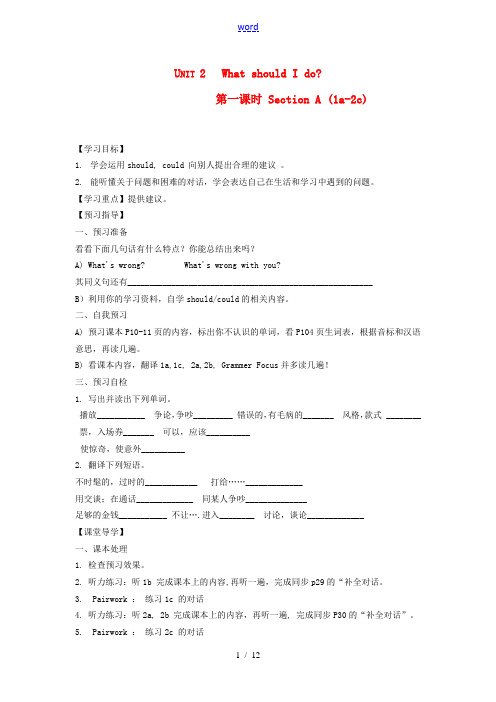
U NIT 2 What should I do?第一课时 Section A (1a-2c)【学习目标】1.学会运用should, could 向别人提出合理的建议。
2.能听懂关于问题和困难的对话,学会表达自己在生活和学习中遇到的问题。
【学习重点】提供建议。
【预习指导】一、预习准备看看下面几句话有什么特点?你能总结出来吗?A) What's wrong? What's wrong with you?其同义句还有________________________________________________________B)利用你的学习资料,自学should/could的相关内容。
二、自我预习A) 预习课本P10-11页的内容,标出你不认识的单词,看P104页生词表,根据音标和汉语意思,再读几遍。
B) 看课本内容,翻译1a,1c, 2a,2b, Grammer Focus并多读几遍!三、预习自检1. 写出并读出下列单词。
播放___________ 争论,争吵_________ 错误的,有毛病的_______ 风格,款式 ________ 票,入场券_______ 可以,应该__________使惊奇,使意外__________2. 翻译下列短语。
不时髦的,过时的____________ 打给……_____________用交谈;在通话_____________ 同某人争吵______________足够的金钱___________ 不让….进入________ 讨论,谈论_____________【课堂导学】一、课本处理1. 检查预习效果。
2. 听力练习:听1b 完成课本上的内容,再听一遍,完成同步p29的“补全对话。
3. Pairwork :练习1c 的对话4. 听力练习:听2a, 2b 完成课本上的内容,再听一遍, 完成同步P30的“补全对话”。
5. Pairwork :练习2c 的对话二、讲练互动参考同步p301 should是________的过去式,用作情态动词时,并不表示_______的动作,只是语气显得更加________。
八年级英语下册unit2whatshouldido导学案

Unit 2 What should I do?Section A (1a-2c)预习案Ⅰ预习导学一、词汇精粹学习建议从课本1a-2c中找出下列单词、短语。
1. 播放2. 争吵;争论3. keep out4. 错误的5. style6.票;入场券7.使惊奇 8.could 9. out ofstyle10. call sb. up 11. 用电话交谈二、听力内容预测(一)牢记P10-P11出现的生词,扫清听力障碍。
(二)观察1a上面的图片和下面的句子,大胆预测:1. What’s the girl thinking in the picture on the top left corner(左上角)?2. What does another girl suggest(建议)to her?3. Should she argue with her parents?三、语法聚焦翻译下列句子。
1.“What’s wrong?”“My clothes are out of style.”2.“What should I do?”“You should say you’re sorry.”3.“What should he do?”“Maybe he should write her a letter.”看一看:1.找出例句1的问句同义句。
2.以上句子中是用哪个单词提建议的,哪一个副词使建议的语气更加委婉?3.将例句2的答语变为否定句。
Ⅱ预习自测一、词汇精粹1. We must have a to watch a movie.2. It’s rude to with others when you have different opinions.3. My son gave me some flowers on Mother’s Day. It really (使惊奇)me.4. The word means“not right”. It is “”5. When a coat is not fashionable,we call it .二、语法聚焦将下列对话搭配起来。
人教版八上unit 2 what should i do讲解
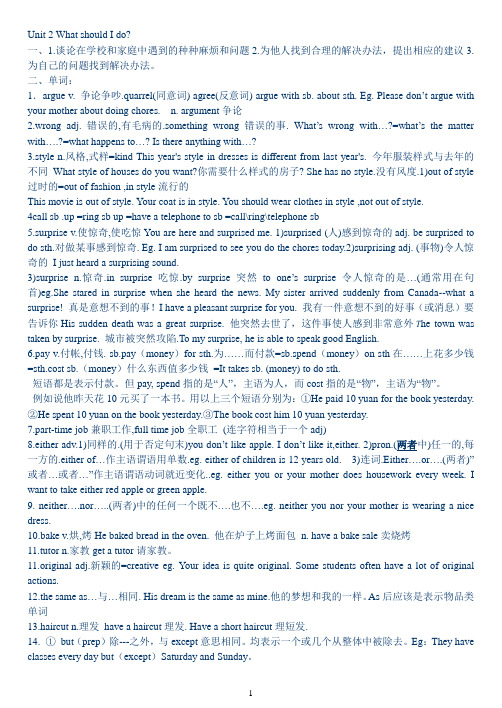
Unit 2 What should I do?一、1.谈论在学校和家庭中遇到的种种麻烦和问题2.为他人找到合理的解决办法,提出相应的建议3.为自己的问题找到解决办法。
二、单词:1.argue v. 争论争吵.quarrel(同意词) agree(反意词) argue with sb. about sth. Eg. Please don’t argue with your mother about doing chores. n. argument争论2.wrong adj. 错误的,有毛病的.something wrong错误的事. What’s wrong with…?=what’s the matter with….?=what happens to…? Is there anything with…?3.style n.风格,式样=kind This year's style in dresses is different from last year's. 今年服装样式与去年的不同What style of houses do you want?你需要什么样式的房子? She has no style.没有风度.1)out of style 过时的=out of fashion ,in style流行的This movie is out of style. Your coat is in style. You should wear clothes in style ,not out of style.4call sb .up =ring sb up =have a telephone to sb =call\ring\telephone sb5.surprise v.使惊奇,使吃惊You are here and surprised me. 1)surprised (人)感到惊奇的adj. be surprised to do sth.对做某事感到惊奇. Eg. I am surprised to see you do the chores today.2)surprising adj. (事物)令人惊奇的I just heard a surprising sound.3)surprise n.惊奇.in surprise 吃惊.by surprise 突然to one’s surprise令人惊奇的是…(通常用在句首)eg.She stared in surprise when she heard the news. My sister arrived suddenly from Canada--what a surprise! 真是意想不到的事!I have a pleasant surprise for you. 我有一件意想不到的好事(或消息)要告诉你His sudden death was a great surprise. 他突然去世了,这件事使人感到非常意外T he town was taken by surprise. 城市被突然攻陷.To my surprise, he is able to speak good English.6.pay v.付帐,付钱. sb.pay(money)for sth.为……而付款=sb.spend(money)on sth在……上花多少钱=sth.cost sb.(money)什么东西值多少钱=It takes sb. (money) to do sth.短语都是表示付款。
人教版新目标八年级下册英语教案:Unit2WhatshouldIdo?
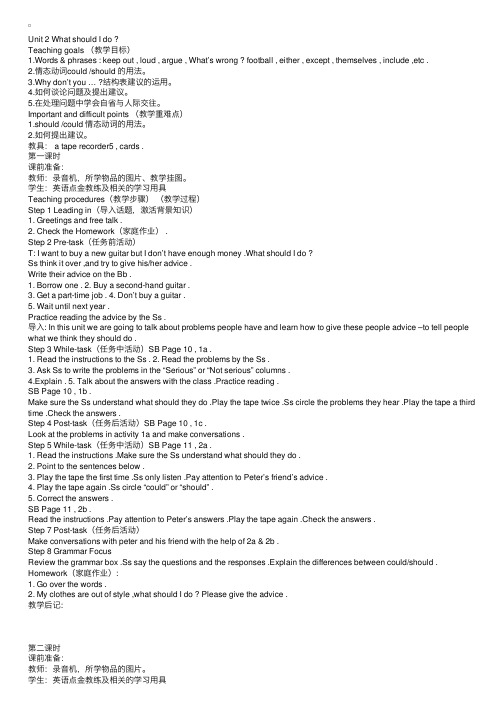
Unit 2 What should I do ?Teaching goals (教学⽬标)1.Words & phrases : keep out , loud , argue , What’s wrong ? football , either , except , themselves , include ,etc .2.情态动词could /should 的⽤法。
3.Why don’t you … ?结构表建议的运⽤。
4.如何谈论问题及提出建议。
5.在处理问题中学会⾃省与⼈际交往。
Important and difficult points (教学重难点)1.should /could 情态动词的⽤法。
2.如何提出建议。
教具: a tape recorder5 , cards .第⼀课时课前准备:教师:录⾳机,所学物品的图⽚、教学挂图。
学⽣:英语点⾦教练及相关的学习⽤具Teaching procedures(教学步骤)(教学过程)Step 1 Leading in(导⼊话题,激活背景知识)1. Greetings and free talk .2. Check the Homework(家庭作业) .Step 2 Pre-task(任务前活动)T: I want to buy a new guitar but I don’t have enough money .What should I do ?Ss think it over ,and try to give his/her advice .Write their advice on the Bb .1. Borrow one .2. Buy a second-hand guitar .3. Get a part-time job .4. Don’t buy a guitar .5. Wait until next year .Practice reading the advice by the Ss .导⼊: In this unit we are going to talk about problems people have and learn how to give these people advice –to tell people what we think they should do .Step 3 While-task(任务中活动)SB Page 10 , 1a .1. Read the instructions to the Ss .2. Read the problems by the Ss .3. Ask Ss to write the problems in the “Serious” or “Not serious” columns .4.Explain .5. Talk about the answers with the class .Practice reading .SB Page 10 , 1b .Make sure the Ss understand what should they do .Play the tape twice .Ss circle the problems they hear .Play the tape a third time .Check the answers .Step 4 Post-task(任务后活动)SB Page 10 , 1c .Look at the problems in activity 1a and make conversations .Step 5 While-task(任务中活动)SB Page 11 , 2a .1. Read the instructions .Make sure the Ss understand what should they do .2. Point to the sentences below .3. Play the tape the first time .Ss only listen .Pay attention to Peter’s friend’s advice .4. Play the tape again .Ss circle “could” or “should” .5. Correct the answers .SB Page 11 , 2b .Read the instructions .Pay attention to Peter’s answers .Play the tape again .Check the answers .Step 7 Post-task(任务后活动)Make conversations with peter and his friend with the help of 2a & 2b .Step 8 Grammar FocusReview the grammar box .Ss say the questions and the responses .Explain the differences between could/should . Homework(家庭作业):1. Go over the words .2. My clothes are out of style ,what should I do ? Please give the advice .教学后记:第⼆课时课前准备:教师:录⾳机,所学物品的图⽚。
新课标人教版八年级英语下册Unit 2 What should I do(1)

Unit 2 What should I do(1)单元教材分析学会should ,Why don’t you和could在英语中的习惯用法。
使用这些习惯用法,就自己生活、学习中存在的某些实际问题提出建议;拒绝、接受别人的建议。
在学习贴近学生生活实际的语言知识的同时,特别关注学生生活和学习中的真实困难和烦恼。
进一步引导学生对自我和周围世界进行比较客观的认识、评价,发展学生主动解决问题的自我意识和行为能力。
发展学生与人和谐交往的能力;培养在学生交流中寻求帮助。
既坚持自己观点、又听取别人建议。
单元总体目标1. The students will learn to talk about problems.2. The students can help people in trouble and how to give advice.3. Practice the sentences with “could, couldn’t, shouldn’t”.4. To learn the words and expressions about reading passage.单元重难点一览单元学情分析In this unit students learn to talk about problems and give advice. First make up a problem you might be having and write you could do about it. Secondly read the problem to the class again and help the class give advice using the words could, should, shouldn’t. In the end, make sentences with the words and write some letters or make conversations.单元教学建议Ask the students to read papers or magazines to find some problems the people have, then ask the students to make a chart with each problem. Ask some students to write a paragraph about the worst advice they ever got, and guess what the problem is. Maybe ask three or five students to work in group for a radio talk show where people call in for advice.单元课时分配Five periods第一课时教学内容1. To learn the words and expressions about this period.2.To talk about the problems serious or not for them in daily life.3.To learn how to describe the problems you have or how to help others to give him orher some advice.教学目标知识与能力1. Knowledge aims: Words and expressions; How to use should, could, shouldn’t;2. Ability aims: Express the good ideas to solve the problems;Help others when they are in trouble.过程与方法首先谈论生活中严肃或不严肃的事情;通过听力训练和口语表达学会如何表达自己的困难,如何给别人提建议等;通过谈论表达自己对有些困难的理解,提出个人不同的建议。
unit2_what_should_i_do?教案

Step ⅠGreetingGreet the class as usual and check the homework. Step ⅡSection AShow a chart on the screen.ProblemI want to buy a new guitar but I don’t have enough money. Advice1. Wait until next year.2. Don’t buy a guitar.3. Borrow one.4. Buy a used guitar.5. Get a part-time job.And tell students what my problem is. Ask students to give advice.Tell students in this unit we’re going to talk about problems people have and learn how to give these people advice—to tell people what we think they should do.Step ⅢShow the new words on the screen. Read the new words and ask students to repeat.keep out; serious; stereo; loud; argue; out of style Step Ⅳ1aNow please open your books at Page 10.Look at activity 1a please.Point to the problems and ask five students to read the problems to the class.S a: My parents want me to stay at home every night.S b: My brother plays his stereo too loud.S c: I don’t have enough money.S d: I argued with my best friend.S e: My clothes are out of style.Read each sentence again and ask students to repeat it.Ask students to explain in their own words what eachsentence means. They can point to parts of the picture,use actions, simple drawings on the board and simplesentences.Then point out the headings in the box to the class. Tellstudents serious problem is a very bad problem, a verybig problem.Ask students to write the problems in the Serious orNot serious columns.Now talk about the answers with the class.Step Ⅴ1bIn this activity first ask different students to say whatthey see in each picture.Then ask students to listen to the conversation. In thechart circle the problems that they hear the girls talkingabout.Play the recording for the first time. Students onlylisten. And then play it a second time. This time studentscircle the problems they hear.Correct the answers.Step Ⅵ1c PairworkFirst ask two students to read the sample dialogue.Then say, Make conversations like this about theproblems in activity 1a.As students talk, move around the classroom checkingtheir work. Offer language support as needed.In the end ask several pairs of students to say theirconversations to the class.Give them little presents if they do their work well.Step ⅦSummaryThis class we’ve learned some key vocabulary. Andwe’ve learnt how to give somebody advice if he or shehas some problems. If you are interested in joining allkinds of activities in class, you’ll make great progress.Step ⅧHomeworkPlease ask your parents or friends what problems theyhave in order to see if you can give them some goodadvice.2listen to the recording this time, ask students to writePeter’s problem on the blank lines in activity 2a.Then check the answers.Answers: I argued with my best friend.Step Ⅳ2bFirst read the instructions. Show students the examplematch.You could write him a letter. I don’t like writing letters.Ask students to listen again and draw lines to match theadvice and the reasons. Like the sample match.Then play the recording again.Check the answers.Answers: 1.d 2.e 3.a 4.c 5.bStep Ⅴ2c Group workThis activity demands students to role play theconversation between Peter and his friend.First tell students how to do this activity.Point to the example in the sample dialogue. Ask twostudents to read the conversation to the class.Point out the sentences in activity 2b.Ask two studentsto role play a conversation between Peter and his friendusing these two sets of sentences.Then have student work in pairs. First one student isPeter and the other student is Peter’s friend.Then thetwo students change places.At the end check the answers by calling on differentpairs to say a conversation to the class. Praise them fortheir good job.Step ⅥGrammar FocusReview the grammar box. Ask students to say thequestions and the responses.Point out that the word should is always used to ask foradvice, but the words could, should, and shouldn’t areused to give advice.Step ⅦSummary and HomeworkThis class we listened to a conversation and knewabout Peter’s problem and the advice his friend gavehim. And we’ve learnt the three words:could, should,shouldn’t. The three words are used to give advice.After class you can have more practice using the threewords to give some advice.4students write “good idea” “okay idea” or “bad idea”next to each suggestion. Ask them to do the activity ontheir own.Then talk about the students’ answers.Read the firstpiece of advice and ask students to raise their hands ifthey think it is a good idea. Then ask students who thinkthis advice is an okay idea to raise their hands. And thenask students who think it is a bad idea to raise theirhands. Write the scores on the board.Repeat for the other pieces of advice.Step Ⅳ3b PairworkFrist point out the example conversation and ask twostudents to read it to the class.Sa: I need some money to buy gifts for my family. Whatshould I do?Sb: I think you should borrow some money from yourfriends.Sa: Oh, no. I don’t like t o do that.Sb: Then I think you should get a part-time job.Sa: That’s a good idea.Ask students to say some ways to get money that aren’tin the book. Write these on the board and explain theseways to the class. Have students work with theirpartners as they ask for and give advice.In the end ask two or three pairs of students to say theirconversations to the class.Step Ⅴ4 PairworkFirst ask students to look at the picture. Say, This isJim. He is a Canadian boy who has come to live inChina with his parents. He wants to practice hisPutonghua, but he is very shy. Make a list of things Jimcould do.Ask students to complete the work in pairs.Ask a few students to list their advice. Write a list ofthe best advice on the board.Step ⅧSummaryToday we’ve learnt how to give somebody advice.Ihope you can learn to communicate with others and helpsomebody if he or she has some trouble.Step ⅨHomeworkPreview the next page.Finish off the workbook exercises.6810activities.2.Many children are under pressure.3.Parents these days push their children much harder than before.petition between families starts at a young age.5.Children should have free time to relax. Then ask students whether the situation is the same in China. Have them discuss with their partners.3bAsk students write four sentences using one of the words from 1b in each sentence.And invite four students write their sentences on the board.3cIf you are Dr Alice Green. Write a letter to Cathy Taylor. Give advice about what she should do with her children.Step ⅤSection 4 Go for it!4aPressure is a serious problem in today’s world.We should find ways to relax.Are you or your friends under pressure?Do a survey to find out.Show the questions on the screen and ask students to do their surveys.Questions1. When do you feel under pressure?2. What should you do to relax?4bIf there is someone in your class who has a big problem, make a plan to help them.Step ⅥIf you have time!If time permits, role-play interviews between a “psychologist” and a person who is under pressure. Step ⅦSummaryThis class we’ve learned a reading passage.And we knew many families and children are under pressure. We should learn how to work and how to relax. If you have any problems, you should solve them as soon as possible. I wish all of you can have a very happy life. Step ⅧHomeworkPreview the next unit.。
- 1、下载文档前请自行甄别文档内容的完整性,平台不提供额外的编辑、内容补充、找答案等附加服务。
- 2、"仅部分预览"的文档,不可在线预览部分如存在完整性等问题,可反馈申请退款(可完整预览的文档不适用该条件!)。
- 3、如文档侵犯您的权益,请联系客服反馈,我们会尽快为您处理(人工客服工作时间:9:00-18:30)。
Unit 2 What should I do?教案Unit2whatshouldIdo?教案单元教学目标与要求课时安排5课时①谈论在学校和家庭中遇到的种种麻烦和问题;②为他人找到合理的解决办法,提出相应的建议;③为自己的问题找到解决办法。
PeriodSectionA(1a—2)Teachingaims.knowledgeaims①keyvocabularies:playcDs,arguewithsb,tooloudoutofstyle,what’swrong?surprise,ticket.②keysentences:what’sthematterwith…?/what’s wrong…?/whatshouldI/he/theydo?youcould/should/…you’d better…whynot…2.AbilityaimsTotrainstudents’abilityofjudgment.TohaveSsgiveadviceToimprove students’ability oflisteningandspeaking.3.EmotionaimsToteachthemtounderstand others.Toteachthemtohelp others whentheyarein trouble. Important difficult pointsToknow about others’trouble Touse different sentences togiveadvice Teaching aidsTape recorder Teaching StepsStep.Lead-in GreetwithSsAsksomeofthem:Areyouhappy today?why? Isicyhappy today? what’sthematterwithhim?Isit serious? whatshouldhedo?由what’s thematter with…?what shouldhedo?这两个学生熟悉的句式导入新课,让学生有话可说,也为下文作铺垫。
Step2.Presentation.PlaythecDveryloud,ask:Doyouthinkitistoonoisy?what’sthematterwithit?/what’swrongwithit?whoplaysthecDtooloud?Isitserious? whatshouldIdo?2.Say:ok.I willturnitdown.Please watchthevideo carefully. Ask:what’s wrongwithNimo?(arguewith)wasit serious? whatdidtheyargue about?Show aform. Nimo’s ideasHis father’s ideas could swimwell couldn’t swimwellcouldgotothedeepsea couldn’t gotothedeepseacouldgotoschool couldn’t gotoschool coulddosomething without you couldn’t do anything without me.HaveSsworkinpairsandactoutthe argument. whydidthey argue?whatdoyouthinkofNimo’s father’s ideas?(outofstyle)could/Should hehatehisfather?whatshould/could hedo?HaveSsgiveNimoadvice.通过播放父与子争吵的影片片断,教授本课的新词汇playthecDs,tooloud/arguewith/outofstyle.学生表演父子争辩的过程既可让学生体会不同角色的不同心情,同时又正确使用了could和couldn’t,为下一步使用could提出了建议,作了铺垫。
Step3.workona,1b.Ask:canyoufindouttheirproblems?Showsomepicturesandaskthem.what’swrongwithher/him?/what’s thematterwithher/him?/what’s thetrouble?Isitserious?HaveSsfinishA.Sslistentothetapeandfinish1b.Atlastaskthem:whatshould/couldtheydo?通过观察图片中人物的表情与动作,将第二步中所学的新的词汇重新复习和巩固,同时教学生用三种不同的句式来发现问题,可以将新旧知识系统化。
Step4.Pairwork.ShowpicturestoSs.Havethemaskandanswerinpairs.让学生熟悉使用should和could提建议Step5.Task.Ask:Doyouhavetheseproblemsorotherproblemsinyourdailylife?canyoutellme?choosesomeofthemtoask.what’s wrong?what’s thematter?/what’s thetroublewithyou?Aftertheytellmetheir problems.IcangiveSsadvice:youshould/could…whynot….whydon’tyou…you’dbetter…通过师生互动,再一次教学生用不同的句式给别人提建议。
Step6.PairworkHaveSsworkinpairstotalk with each other about their problems andgive each other advice atthe same timeGetSstousedifferentsentences通过学生的活动,让学生亲身体验找问题及提建议的各种说法。
Step7.Task.Say:Ihaveaseriousproblem.Iarguedwithmybestfriendyesterday.couldyougivemesomeadvice? Divide thewhole classintwo groups andhavea match.See which groupcangive more advice. After each student givesmeadvice.Icansay:ok,Iwilldoit.ButIdon’twanttosurprise him.Idon’thaveenough money/enough timeAtlastaskthem:couldIgiveheratickettoamovie?HaveSsdiscuss.通过这一任务,进一步巩固提建议的各种句式,同时用集体的力量让学生懂得更多的解决朋友间矛盾的方法,提高他们解决问题的能力,同时为2a,2b作铺垫。
Step7.workon2a,2bSoy:Peter hasthesame problem andhisfriendisgiving him advice HaveSslistentothetape twiceandfinish2a and2b.有了前一部分的铺垫,再用2a,2b这两项听力练习来提高学生听的能力。
Step7.HomeworkBbdesignwhat’swrong?/what’sthematter?PlaycDStooloudarguedwith…outofstyle.whatshouldshe/he/I/theydo?She/He/you/should/could do….you’dbetter…whynot…?Period2SectionA(3a—4)Teachingaims.knowledgeaims:a)keyvocabularies:payfor,part-timejob,okay,either,bake,Teen Talk,tutor.b)keysentenceswhatshouldIdo?youcould/should/shouldn’t…Hedoesn’thaveanymoney,either.2.Abilityaims:Totrainstudents’abilityofjudgment.Toimprove students’abilityofreadingand speaking. 3.Emotion aims:Tobeableto cooperate with others,help eachotherand complete thetask-basedactivities. Encouragethestudentstostudyhardandgetoverthe difficulties.4.Important anddifficult points.Togivesb.advice.5.Teaching aids:cAITeaching Steps:Step1.Revision yesterdayyouhelpedmanypeoplesolvetheir problems.Nowpleaselookatthevideotape.what’s wrongwiththegirl?whatshouldshedo?Pleasegivehersomeadvice.youcanuse:Ithinksheshould…/Shecould/She’dbetter….Flash动画效果在视觉上刺激学生,同时也复习了第一课时的重点句型,为本课时学生提建议奠定基础。
Step2.PresentationTodayIhaveaproblem.I wanttobuyaguitar.But Idon’t have enough money.what shouldIdo?Thinkitover.Please givemesome advice.The more,the better.S1:you’d better notbuyitnow.T:whatdoyouthinkofthe advice? Good idea,okay ideaorbad idea?why? HerearesomeadviceIgotfromtheothers.Please lookatthemquickly,then sayeachpieceofadviceaseithergoodidea,okay ideaorbadidea. Readthefirst pieceofadvice andask students toraise their handsiftheythinkitisagood idea.Thenstudents whothinkthis adviceisanokayideatoraisetheir hands.Then askthe students whothinkitisaideatoraisetheirhands.writethescoresontheboard.Repeatfortheotherpiecesofadvice.鼓励学生把自己的建议大胆说出来。
